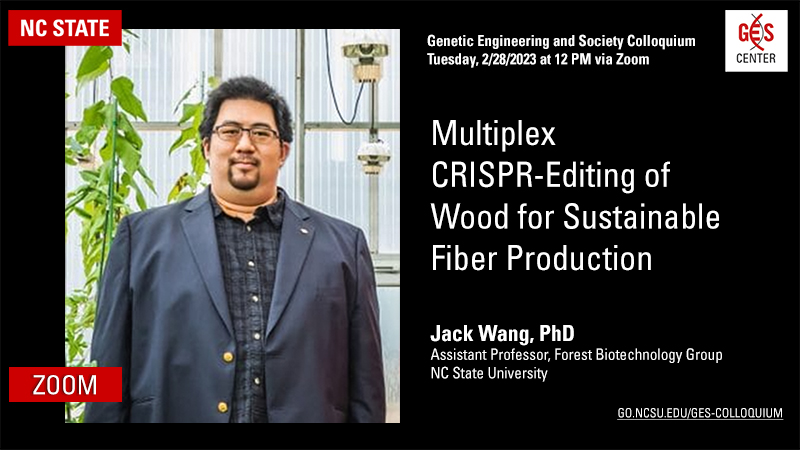
- This event has passed.
Jack Wang – Multiplex CRISPR-Editing of Wood for Sustainable Fiber Production | GES Colloquium, Spring 2023

Colloquium Home | Zoom Registration | GES Video Library (current) | Video Archives | Podcast | @GESCenterNCSU | Newsletter
Multiplex CRISPR-Editing of Wood for Sustainable Fiber Production
Jack Wang, NC State University, Assistant Professor, Director of Forest Biotechnology Group, at NC State University
NOTE: The video and podcast of this colloquium will be embargoed until after the referenced research is published (date TBD).
Abstract
Wood is the most abundant carbon biomass on earth and the major source of sustainable green fibers and bioproducts. Globally, 550 gigatons of carbon are stored as wood, representing 57% of the biogenic carbon sink. Despite the importance of wood fibers, its production has remained largely limited to undomesticated forest trees with often sub-optimal wood properties that hamper production efficiency. Here, we show that strategic multiplex CRISPR-based genome editing of monolignol biosynthetic genes improves wood properties beyond natural variations or the editing of single genes, and debottlenecks a key operational constraint in industrial pulp mills. The improvements substantially increase fiber production capacity while reducing the global warming potential of pulp mills, leading to a more sustainable and efficient fiber bioeconomy.
Speaker Bio
Jack Wang is Assistant Professor and Director of the Forest Biotechnology Program at NC State University. He is also co-founder and CSO of TreeCo, an NCSU startup company. His research focuses on the molecular genetics and genome editing of trees to enhance forest resilience and productivity.
GES Colloquium (GES 591-002) is jointly taught by Drs. Jen Baltzegar and Dawn Rodriguez-Ward, who you may contact with any class-specific questions. Colloquium will generally be live-streamed via Zoom, with monthly in-person meetings in 1911 Building, Room 129. Please subscribe to the GES newsletter and Twitter for updates.
WordPress database error: [Unknown column 'wp_tec_occurrences.start_date' in 'SELECT']SELECT SQL_CALC_FOUND_ROWS wp_posts.*, CAST( wp_tec_occurrences.start_date AS DATETIME ) AS event_date
FROM wp_posts LEFT JOIN wp_term_relationships ON (wp_posts.ID = wp_term_relationships.object_id) LEFT JOIN wp_postmeta ON ( wp_posts.ID = wp_postmeta.post_id AND wp_postmeta.meta_key = '_EventHideFromUpcoming' ) LEFT JOIN wp_postmeta AS mt1 ON ( wp_posts.ID = mt1.post_id )
WHERE 1=1 AND wp_posts.ID NOT IN (18427) AND (
wp_term_relationships.term_taxonomy_id IN (149,521,604)
OR
wp_term_relationships.term_taxonomy_id IN (45,518,607,872,883)
) AND (
wp_postmeta.post_id IS NULL
AND
( mt1.meta_key = '_EventStartDate' AND CAST(mt1.meta_value AS DATETIME) >= '2026-02-23 09:16:16' )
) AND wp_posts.post_type IN ('post', 'page', 'attachment', 'tribe_venue', 'tribe_events', 'tribe_event_series') AND ((wp_posts.post_status = 'publish'))
GROUP BY wp_tec_occurrences.occurrence_id
ORDER BY event_date ASC, wp_posts.post_date ASC
LIMIT 0, 3